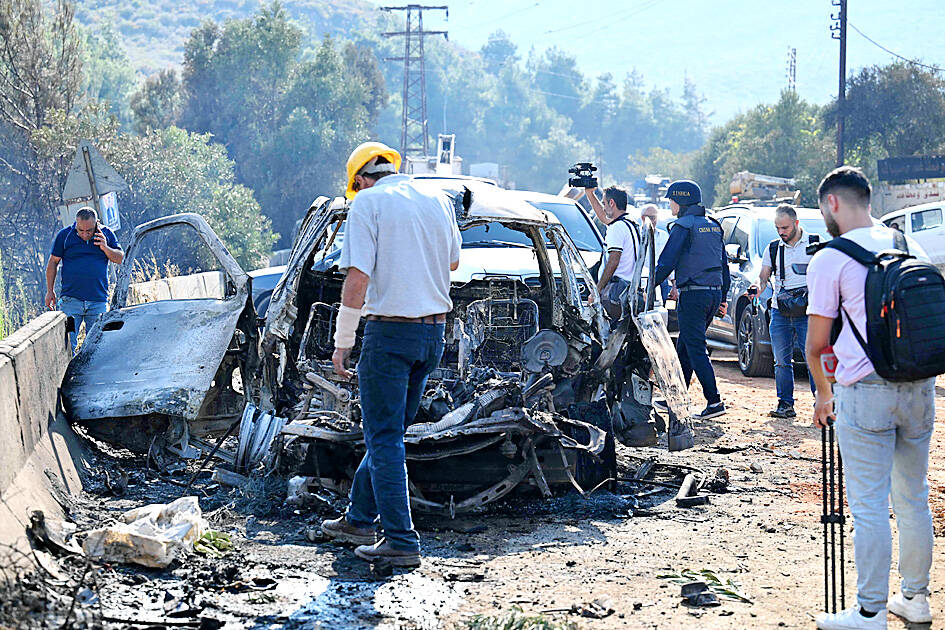Syrian state media yesterday said that overnight Israeli strikes killed 16 people in central Hama Province, while a war monitor reported a higher death toll in the “intense” raids on military sites.
The Israeli military, which has carried out hundreds of strikes in Syria since its civil war started in 2011, declined to comment on the latest reported attack.
Syrian news agency SANA, citing a medical source, said the number of dead “in the Israeli aggression on a number of sites on the outskirts of Masyaf” was “16 martyrs and 36 wounded, including six critically,” updating an earlier toll of 14.

Photo: AFP
The Syrian Observatory for Human Rights war monitor reported “intense Israeli strikes” overnight, providing an updated of toll of 25 dead, including “five civilians, four soldiers and intelligence personnel, and 13 Syrians working with pro-Iran groups.”
Three more bodies were unidentified, the observatory added.
Israeli strikes on Syria since 2011 have mainly targeted army positions and Iran-backed fighters, including from Lebanon’s Hezbollah group.
Israeli authorities rarely comment on individual strikes in Syria, but have repeatedly said they would not allow Iran to expand its presence in the nation.
The Britain-based observatory, which relies on a network of sources inside Syria, earlier said that the strikes targeted sites “where pro-Iran groups and weapons development experts are stationed.”
The observatory said “Israeli strikes ... targeted the scientific research area in Masyaf” in Hama Province and other sites, destroying buildings and military centers.
SANA, citing a military source, reported that at about 11:20pm on Sunday, “the Israeli enemy carried out an air attack” from the direction of northwest Lebanon “targeting a number of military sites in the central region.”
Air defenses “shot down some” of the missiles, SANA reported.
It was “one of the most violent Israeli attacks” in Syria in years, observatory head Rami Abdel Rahman said.
He said Iranian experts “developing arms including precision missiles and drones” worked in the scientific research center that was hit.
Iranian Ministry of Foreign Affairs spokesman Nasser Kanani told a news conference: “We strongly condemn this criminal attack by the Zionist regime on Syrian soil.”
The Syrian Ministry of Foreign Affairs and Expatriates condemned the raids, accusing Israel of trying to “provoke a further escalation in the region.”
Israeli raids on Syria surged after Hamas’ attack on Israel last year that sparked war in Gaza, then eased somewhat after an April 1 strike blamed on Israel hit the Iranian consular building in Damascus.
Syria has sought to stay out of the Israel-Hamas conflict, which has raised fears of a broader regional war.
Late last month, several pro-Iranian fighters were killed in Syria’s central Homs region in strikes attributed to Israel, the observatory said.
Days later, the Israeli military said it killed an unspecified number of fighters belonging to Hamas ally Islamic Jihad in a strike in Syria near the Lebanese border.
The Syrian government’s brutal suppression of a 2011 uprising triggered the conflict that has killed more than 500,000 people.

AGING: As of last month, people aged 65 or older accounted for 20.06 percent of the total population and the number of couples who got married fell by 18,685 from 2024 Taiwan has surpassed South Korea as the country least willing to have children, with an annual crude birthrate of 4.62 per 1,000 people, Ministry of the Interior data showed yesterday. The nation was previously ranked the second-lowest country in terms of total fertility rate, or the average number of children a woman has in her lifetime. However, South Korea’s fertility rate began to recover from 2023, with total fertility rate rising from 0.72 and estimated to reach 0.82 to 0.85 by last year, and the crude birthrate projected at 6.7 per 1,000 people. Japan’s crude birthrate was projected to fall below six,

US President Donald Trump in an interview with the New York Times published on Thursday said that “it’s up to” Chinese President Xi Jinping (習近平) what China does on Taiwan, but that he would be “very unhappy” with a change in the “status quo.” “He [Xi] considers it to be a part of China, and that’s up to him what he’s going to be doing, but I’ve expressed to him that I would be very unhappy if he did that, and I don’t think he’ll do that. I hope he doesn’t do that,” Trump said. Trump made the comments in the context

SELF-DEFENSE: Tokyo has accelerated its spending goal and its defense minister said the nation needs to discuss whether it should develop nuclear-powered submarines China is ramping up objections to what it sees as Japan’s desire to acquire nuclear weapons, despite Tokyo’s longstanding renunciation of such arms, deepening another fissure in the two neighbors’ increasingly tense ties. In what appears to be a concerted effort, China’s foreign and defense ministries issued statements on Thursday condemning alleged remilitarism efforts by Tokyo. The remarks came as two of the country’s top think tanks jointly issued a 29-page report framing actions by “right-wing forces” in Japan as posing a “serious threat” to world peace. While that report did not define “right-wing forces,” the Chinese Ministry of Foreign Affairs was

PREPAREDNESS: Given the difficulty of importing ammunition during wartime, the Ministry of National Defense said it would prioritize ‘coproduction’ partnerships A newly formed unit of the Marine Corps tasked with land-based security operations has recently replaced its aging, domestically produced rifles with more advanced, US-made M4A1 rifles, a source said yesterday. The unnamed source familiar with the matter said the First Security Battalion of the Marine Corps’ Air Defense and Base Guard Group has replaced its older T65K2 rifles, which have been in service since the late 1980s, with the newly received M4A1s. The source did not say exactly when the upgrade took place or how many M4A1s were issued to the battalion. The confirmation came after Chinese-language media reported